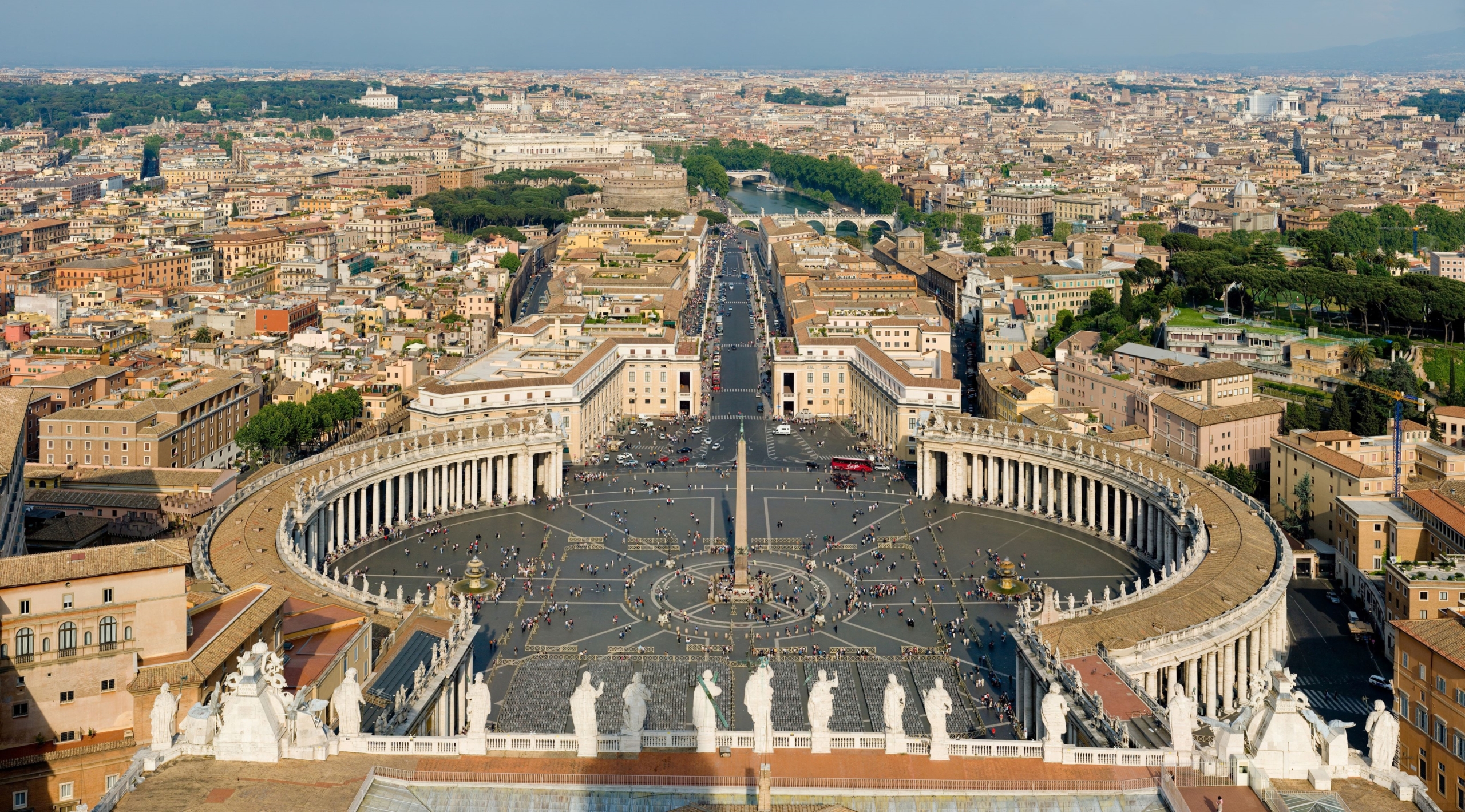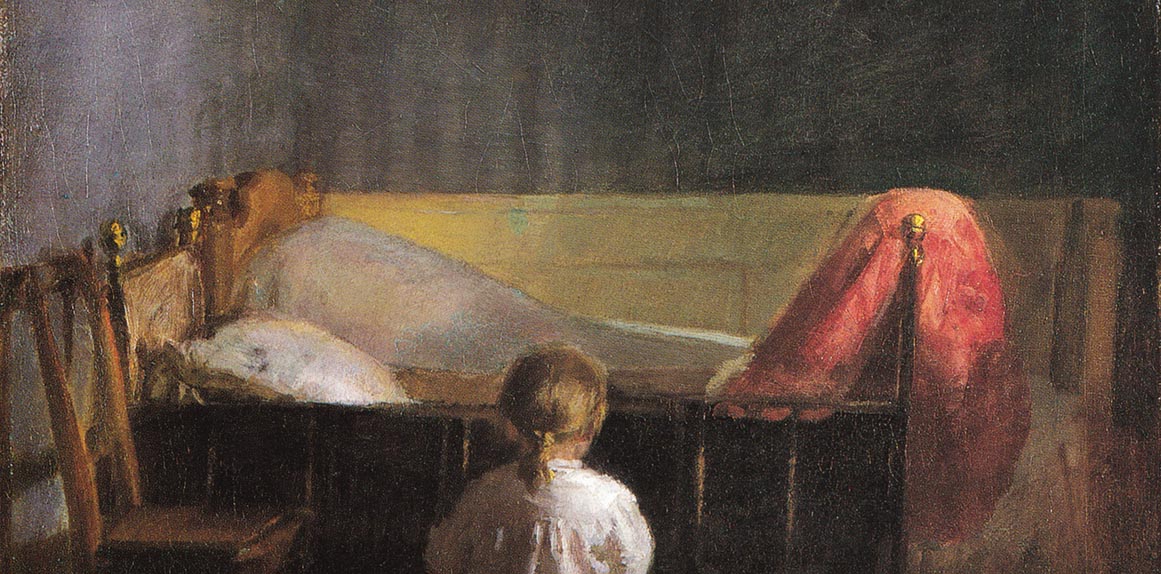Tag: Divine Indwelling
My Grace is Sufficient for You

“All of this is because a fisherman died here,” said my then friend, now fellow Dominican Brother, as we stood atop St. Peter’s Basilica in Rome. It is true. The fisherman from Galilee, buried 450 feet below us, was certainly not wise by human standards, powerful, nor well born. (1 Cor 1:26). He was not preserved from serious sins like Mary, John the Baptist, or John the Evangelist. This was the disciple who denied Our Lord three times (Luke 22:54–61). Nonetheless, our Lord still called Simon son of Jonah. He built his Church on him and gave him the keys to the Kingdom of Heaven (Matt 16:17–18). He told him to feed his sheep and foretold his martyrdom on the Vatican hill (John 21:15–19). This calling and the grace our Lord gave to this weak fisherman turned him into a strong fisher of men, and shepherd of souls.
From the top of St. Peter’s we could also see another massive basilica down the Tiber. This one does not house the bones of a fisherman. Rather, it is built over the tomb of a radical first century pharisee (Phil 3:4–6). A man not even fit to be called an apostle because he persecuted the Church of God (1 Cor 15:9). A man who consented to the execution of St. Stephen (Acts 8:1) and tried to destroy the Church (Gal 1:13). Yet this man, this sinner, was chosen by God’s grace. This man was struck down on the road to Damascus (Acts 9:1–9), and encountered the Risen Lord (Gal 1:12). These two men, one uneducated and ordinary (Acts 4:13), and the other an enemy of God (Rom 5:10), were reconciled to God! They became Peter, the rock on which the Church is built (Matt 16:17) and Paul, God’s chosen instrument (Acts 9:15).
These two sinners-turned-saints are useless on their own. Peter is not the rock of his own Church; he is the rock on which Christ builds his Church. So too Paul, as a chosen instrument of grace, is nothing without someone to use the instrument, namely Christ. These two men remind us that without God we can do nothing (John 15:5). For these men are apostles only because Jesus is “the apostle and high priest of our confession” (Heb 3:1). They are bishops and shepherds only because Jesus is “the shepherd and bishop of our souls” (1 Pet 2:25).
Despite their sins, despite their mediocrity, God did amazing things with these two men. God made them like Jesus. God used their suffering to “fill up what is lacking in the afflictions of Christ on behalf of his body, which is the church”(Col 1:24). He made them a spectacle to the world, being hungry and thirsty, naked, roughly treated, homeless, and toiling (1 Cor 4:11–12). He made them like Jesus who had nowhere to rest his head (Matt 8:20). God took these men and conformed them to Jesus Christ, using them to bring his gospel to the ends of the earth (Ps 19:4). This conformity to Jesus went deep; he even gave Paul his marks on his body (Gal 6:17).
In the end this transformation, begun on the beach in Galilee and on the road to Damascus, ended in Rome. Peter was so configured to the cross of Christ, that he, like the savior, was crucified. So too Paul was executed in the same city by beheading. However, their martyrdom was not merely the result of their work in the Lord’s vineyard. The grace of final perseverance was a gift, but it was not only a gift for these blessed Apostles. This final grace given to Peter and Paul extends to you and me! The same grace God used to save them, he now uses through them to save us. So that just as their voices went out through all the world in their earthly life, their prayers in heaven now bring us the graces of Jesus Christ!
Tomorrow the Church celebrates the principal feast of these heavenly patrons. Let us turn to them as our fathers and sources of Sacred Scripture and the Tradition of the Church. But more than that, let us turn to them because they are reigning in heaven! The rock still supports the Church, and the chosen instrument still intercedes for men.
Photo by David Iliff (CC BY-SA 3.0)
Originally posted on Dominicana Journal on June 28, 2022
God is Not Far From Us

Pause for a minute and consider God.
Where does your mind take you?
I think for most of us the mind goes outward. We imagine God somewhere way out there beyond the stars and outer limits of the cosmos. From his seat faraway, he admires all he has made, and if we’re lucky, he might even look upon one of us with his favor.
This perspective is problematic.
First, God does not have a body; he is therefore not “in a place” or “far away.” “Where” is he then? Everywhere. Saint Paul teaches, “He is actually not far from each one of us, for ‘In him we live and move and have our being’” (Acts 17:27b-28a). I am because God is. Those things that are deepest in me—my life, my ability to will this or that, my very existence—are caused at all times and in all places by God’s innermost presence (cf. Thomas Aquinas, ST I, q. 8, a. 1). The hand holding a cup of coffee four feet from the ground is like God holding me in being. His “right hand holds me fast” (Ps 63:9 Grail), and he does not let go. “Where shall I go from your Spirit? Or where shall I flee from your presence? If I ascend to heaven, you are there! If I make my bed in Sheol, you are there!” (Ps 139:7-8). Wherever I am, there God is. Reason alone can even lead us to this awesome conclusion.
Beyond reason’s ambit, however, there lies a yet more profound truth about God’s nearness to the human soul. The Son reveals this truth: “If anyone loves me, he will keep my word, and my Father will love him, and we will come to him and make our home with him” (John 14:23). The Son reveals that God is a communion of Persons—Father, Son, and Holy Spirit—who dwell together in perfect unity (cf. John 10:30). The Son reveals that God has invited us to share in this communion. The Son reveals that our sharing in this communion is made possible by God dwelling in our souls. When the soul is in a state of grace, God is inwardly present not only as sustainer and mover, but as light and fire making us capable of divine knowledge and love (Thomas Aquinas, ST I, q. 43., a. 3). The Father sends his Son, “the light of men” (John 1:4), to illuminate our minds with the truth of God. The Father and the Son send the Holy Spirit to enflame our hearts with the love of God (Rom 5:5; cf. John 14:16). And where the Son and the Spirit are, there too is the Father. The body becomes a temple for the Triune God (1 Cor 6:19).
It is not altogether wrong for the mind to go outward in contemplating God. God is wholly other. An infinite gap separates the Creator and the creature. My existence (the entire world’s existence!) is not necessary. God, on the other hand, is his own existence and he necessarily is: “I am who I am” (Ex 3:14). But precisely because of God’s supreme transcendence, he is most inwardly in all that is. The Christian at prayer contemplates a truth yet more marvelous. Gazing inwardly not to consider himself but to consider God, he might pray,
O my God, Trinity whom I adore, help me to forget myself entirely that I may be established in you as still and as peaceful as if my soul were already in eternity.
May nothing trouble my peace or make me leave You, O my Unchanging One, but may each minute carry me further into the depths of Your Mystery.
Give peace to my soul; make it Your Heaven, Your beloved dwelling and Your resting place. May I never leave You there alone but be wholly present, my faith wholly vigilant, wholly adoring, and wholly surrendered to Your creative Action
(Saint Elizabeth of the Trinity, Prayer to the Holy Trinity).
Image: Anna Ancher, Evening Prayer (Wikimedia Commons)
Originally posted on Dominicana Journal
